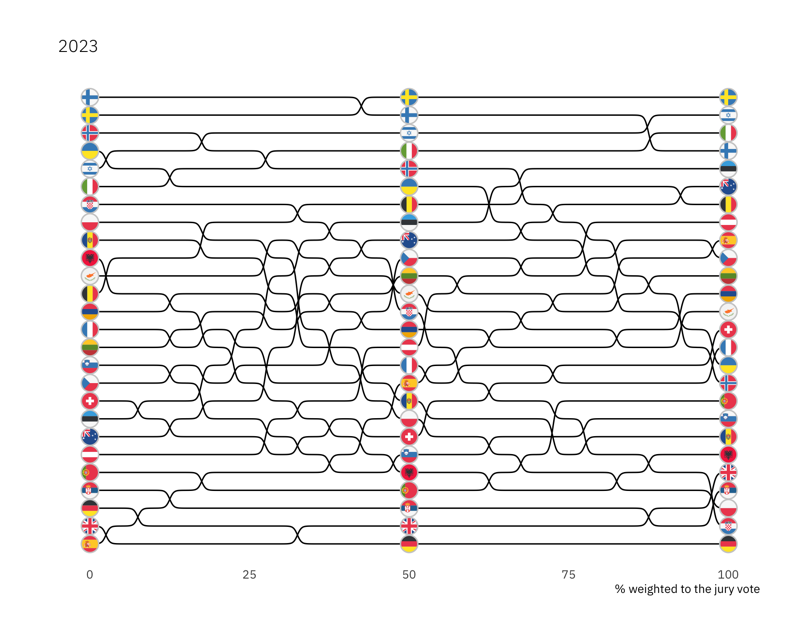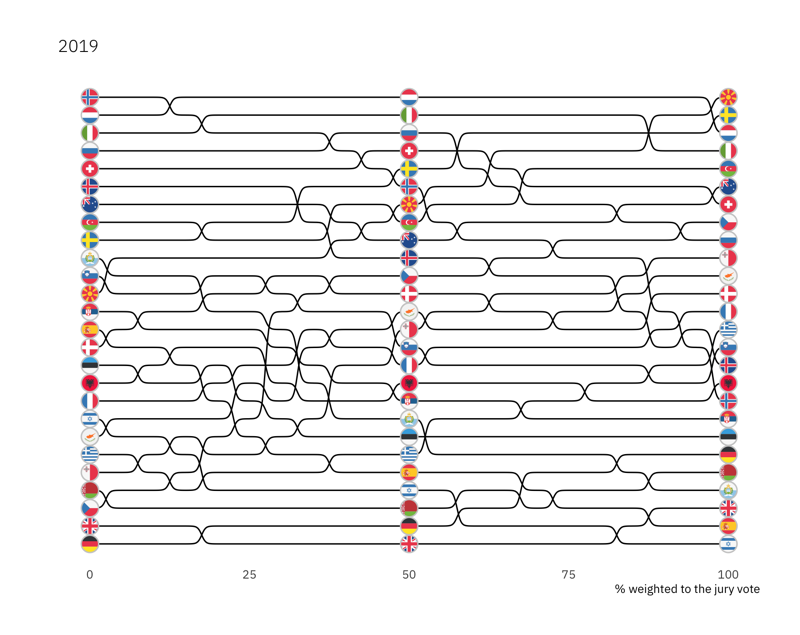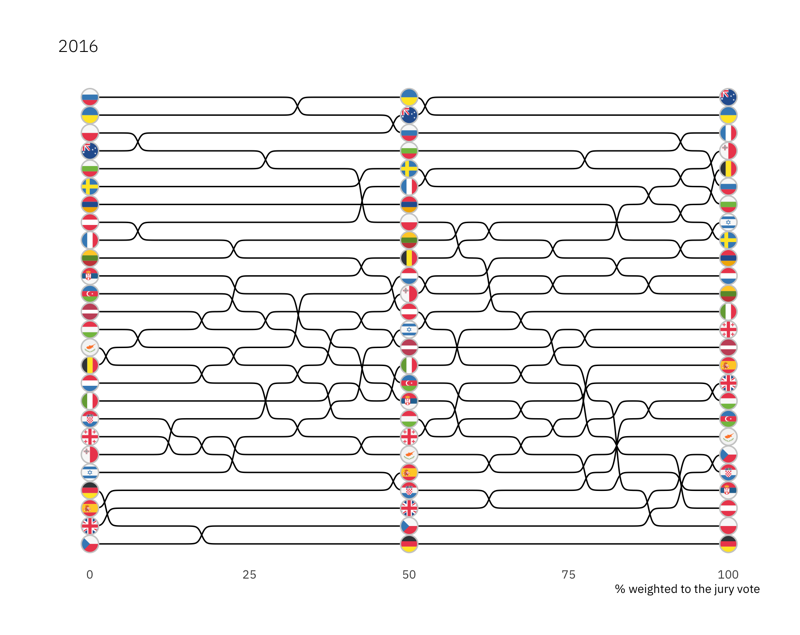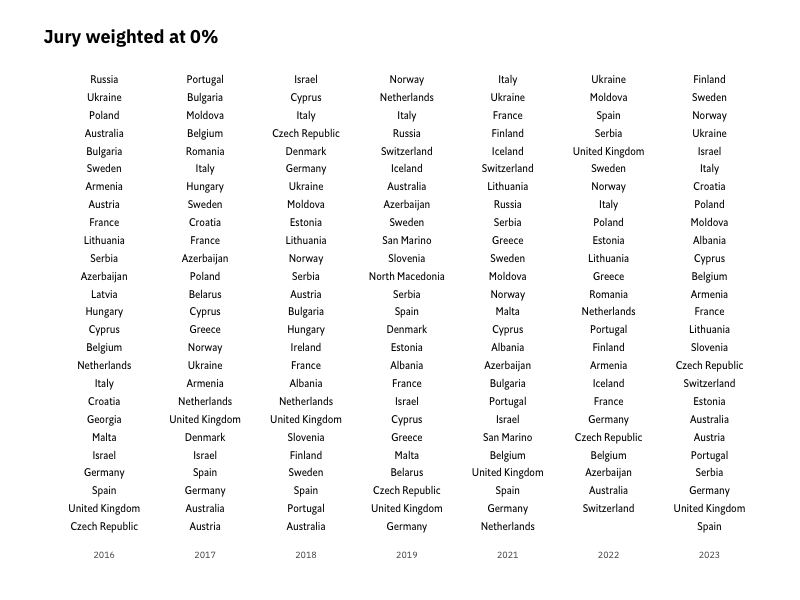The system for allocating points in the Grand Final of the Eurovision Song Contest has been more-or-less stable since 2016. In that year, the points allocated by televoters and juries were split, with each country’s jury and televote awarding 1-8, 10, and 12 each, rather than having them combined. The televote and jury vote was equally weighted. The introduction of a televote from the rest of the world in 2023 tipped the balance very slightly away from juries, but juries still hold over 49 percent of the power.
Every year, people ask questions about whether the balance is right. If your favourite act won the televote, but didn’t win the Song Contest, you might think that the juries are antidemocratic; if your favourite act scored highest among the juries, you might think that song quality should be ultimately the thing that’s rewarded. Thanks to the 2023 Contest, the conversation has been more pointed than it has in the past. The televote winner doesn’t always lift the trophy, but Käärijä won more televote points than any act that hasn’t ended up winning. So maybe the balance should be different? 60/40 in favour of the televote? 75/25? What would happen if we changed the formula?
Tipping The Scales
Let’s have a look at all of the possibilities.

Eurovision Jury v Televote Balance 2023 (Mark Taylor)
This figure shows how the results of the 2023 Song Contest would change with different balances; from 100 percent televote on the left-hand side, through 50/50 (in the middle), to 100 percent jury votes on the right-hand side. You can easily see this year’s crossover point… if televoters held 59 percent of the power we’d all be off to Finland next year, with Loreen having lost by just a single point, but at 58 percent we’d still be pre-booking Airbnbs with free cancellation in Stockholm right now.
You can make your way along the graph and identify whatever ranking feels fairest. Remember this… you have to choose the split before you hear any songs, and you can’t change that year’s rules after you’ve made them: what if tweaking the figures for 2023 would have led to an act you loved losing ground in a previous year?
To unpack this a bit more, let’s look at how it looked the last time a televote winner’s points ended up getting outweighed by the juries. That was 2019, when Keiino scored 30 points more than second-placed Duncan Laurence among the general public, but with a relatively weak jury performance that put them in sixth place on the final results table. If 59/41 would have done it for Finland in 2023, what do we need to do to have made it work for Norway in 2019?

Eurovision Jury v Televote Balance 2019 (Mark Taylor)
Unfortunately for anyone who’d have enjoyed watching Alexandra, Tom, and Fred performing a reprise of ‘Spirit in the Sky’ over the credits, the televoters would have had to have had 87 percent of the power in 2019 to make that happen. Even if we take the juries’ power all the way down to 14 percent, Duncan Laurence still would have lifted the trophy.
It’s even more extreme on the other end. If the juries had held 95 percent of the power in 2019, it’s still a win for the Netherlands. North Macedonia only would have taken the prize if 96 percent of the balance went to the juries rather than to the televoters. Given that a Dutch win would have been guaranteed with any result from 14% to 95%, I don’t think anyone’s complaining about the 2019 result.
Maybe the best is to go for an option where the balance is more towards the televoters, but not overwhelmingly so. I’ve seen 70/30 suggested online as a compromise: that way, the televoters get most of the power, but the juries are still around to counterbalance. While it might have been exciting to see Finland win by just one point, a balance that’s more decisively towards the televoters might have given ‘Cha Cha Cha‘ the comprehensive win that it deserved. Right?
When this voting system was introduced for the first time, in 2016, Jamala won the competition representing Ukraine after coming in second place among both juries and televotes. What would have happened if we’d gone for 70/30 that year?

Eurovision Jury v Televote Balance 2016 (Mark Taylor)
In that case, we’d have seen Eurovision 2017 taking place in Russia as a 70/30 split would have seen Sergey Lazarev win. Even a small shift to 55/45 lifts him into second place above Australia’s Dami Im.
Better The Devil You Know?
We should be careful what we wish for. While we might have been all in favour of a balance tilted towards the televote this year, that would have had consequences in previous contests that we might look back on with a sense of discomfort rather than pride. I’m not saying the balance is definitely right at 50/50, but every balance brings in its own problems.
If you want to make your own call, here’s how the results for all of the Grand Finals where we can easily change the balance of jury to televote.

Eurovision Jury v Televote Balance (animation by Mark Taylor)
Let us know what percentages you think lead to the best tables overall for those seven Grand Finals!










Very interesting charts, thanks for all the work you’ve put in that. Still, it doesn’t change my longstanding view that the “split” should be 0% Jury / 100 % Televoting. Yes, even with Russia winning in 2016 over Ukraine. I love 1944, but Sergey was the fair winner. Same goes for Keiino and Käärijä. I just can’t understand why the personal taste of five random people should outweight the personal taste of millions of viewers and voters. And spare me with the BS that they’re there to “honour quality”. If so, juries should have ranked “Eaea” first, but they didn’t. This year’s semi finals, where we had 100% televoting and an absolutely excellent and fair results just proves that it works and that we don’t need juries at all.
I’d accept a 100% televote if the televoting audience commits to watching all performances and run an app that verified that they did it. Otherwise the televote would be unfair just in a different way.
This could be done by requiring to use a eurovision voting app with microphone access and on each they’d have to vote while the song is playing. Then at the end based on that vote they’d send a favorite and well as the whole list. Since older viewers often don’t have smartphones, the result would have to be age group adjusted. Sounds too complicated? Then keep the jury vote…
Following this year’s fiasco result, I’m all for abolishing the juries. Or at the very least, diminishing their power to 25-30% at most. And not just because of this year’s result, but I’ve now carefully looked at the songs over the jury years that have got more jury votes than televotes, and vice versa, and noticed that practically all my favourites are in the latter category, i.e. televote favourites. Jury favourites are the ones I’ve mostly forgotten entirely (and from online discusions, I’m not the only one by far). Aufrechtgehn has already pointed out most of the factors in favour of this, and I agree. (I only disagree with 2016, I love Jamala’s entry more than anything else that year, and it still got more televotes than jury votes; Russia did get most televotes, but a lot of those are due to diaspora, so it’s not really a comparable case to this year’s result.)
And I don’t understand this “but consider the risks”; the only risk in letting televoters decide is an entry winning only thanks to diaspora, but as Russia isn’t participating anymore, and it was the biggest benefiter of diaspora, it’s not an existing risk now.)
For those of you who wish to abolish the juries, I would like to remind them that the televoters had some bad choices in the past.
2001 and 2002 are 2 years which come to mind. It was televoters only results and the those 2 winners are considered 2 of the worse winners, ever. No one can even remember how these song sound.
If we change the balance between juries and televoters or even if we abolish the juries, there will always be complaints about the results.
I don’t mind the juries I think they bring dome balance to the proceeding, however sometime, and especially this year, I ask myself if the juries are doing their work properly?
3 cases come to mind:
Case 1 is Slovenia – It is a well crafted song, performed and sung well. I think this should have been in the top 5 of every jury. Yet they were totally ignored by the juries. Were the juries deaf? Were they paying any attention to the song? Or were they ignoring this one because it was sung in Slovenian? I really to wonder about this.
Case 2 is Spain – let’s face it, it wasn’t an easy song. That said, I think if the juries has done there job properly, this should have been on every jury rank as appreciation for the professional song and presentation this was. As a professional music industry, the juries are supposed to be , they should have acknowledged this. With 95 points form 21 juries they just were showing middle finger to the singer and the craft she was presenting.
Case 3 is Finland – 14!! juries didn’t give any point to Finland. 14 professional juries thought that this song wasn’t good enough to give it any point(on a side note – if each of these juries would have given an average of 4 points to Finland, we may have been looking at a very close or even a different results- but this a different story). Again , were the juries listening to the song or were they shocked form the performance and were afraid to put their vote on the song? Was the Finish language a barrier for the juries? Was the song too aggressive? I would love to hear the explanation from those zero point juries to why they have voted down this song?
As mentioned above- I don’t mind the juries. I have an issue with how predictable their vote has become. I have an issue with the fact that the juries seem to be closed minded and that they don’t dare to vote for something which doesn’t fall under what people perceive as a jury’s song. Juries will go mostly for the safe option. I wish they would be more daring in their choices, less predictable. I wish that juries were less homogeneous in their choices than they are now.
Having two sides to the vote, especially in the way it is now presented, is always going to create time-wasting arguments. As well as fake moments of suspense when most of us could work out that there would be more than enough televote points left for Sweden to win.
I would like to see each countries randomly draw for either a televote or jury preference and then submit their votes only by that process for that year. So there still would be a 50-50 split, but we’d only have one set of scores to announce and publish. The result would be less predicable, simpler, and quicker to process.
I want to keep the 50/50 system. Since 2012 televoters had their winner twice as often as juries. It happened two times that juries had their winner (that did well in televoting too), four times televoters had their winner, and five times both. So in practice the 50/50 system is already tilted towards televoters.
No system is perfect, but 50/50 is the least bad of all. If you have juries, they will influence the result. Sometimes they will be decisive on the winner, but more often televoters are decisive on the winner.
They could maybe look at more diversity in the selection of jury members (more ‘outsiders’ from outside the broadcaster or ESC fandom) but the 50/50 system itself is working. I would also bring back juries in the semifinals. It would not change much on the qualifiers, but having juries in the semis can influence the type of entries that countries send. More variety.
Some people are mad because they wanted their favorite Finland to win this year. I understand that. Italy was my favorite in 2015. But it’s not a contest between two countries, it’s between 26 in the final, and 37 in total.
I like the 50/50 split its exciting, improves song quality, and counteracts neighbourly voting which is why it was brought in originally. It would be a shame to return to the gimmicky low quality contests of the early 2000s.
I couldn’t disagree more with the last commenter, Stu H – I really don’t know where people do get that incorrect & odd idea of “gimmicky low quality contests of the early 2000s” – I remember those very well, thank you, and they were not any lower quality than now! That “gimmicky” is a very personal view, not by any means shared by the majority. From some other comments here, too, it seems some people are really afraid of people’s power, which is very odd, and not how it should be. Don’t know how anyone can defend the juries. We live in age of democracy after all, we don’t need some biased, patronizing arbitrators to tell us what is “good taste” and what isn’t!!
I think this year’s “result” has been so controversial because the winner had been effectively decided the day before the grand final had even been broadcast. 185 people behind closed doors had rendered the paid votes of millions of people across Europe, Australia and the rest of the world completely pointless (in terms of selecting a winner). In addition, those juries are supposed to be music industry experts but the criteria seems very loose to put it mildly. Also, the jury vote has become entirely predictable – they will always vote heavily for Sweden and pretentiousness in that order. They are totally averse to anything fun or frivolous however good it might be. So everyone knows entries like Norway’s Keino can’t win, or the fabulously fun Moldovan entry from last year or indeed Kaarija from this year. Therefore the juries have become a handicap system for anything new and original. That’s why the result is entirely predictable and bookmakers were able to have Sweden as long odds on for months.
Thank you for writing about the jury vote fiasko. I am very angry with the EBU, Sweden, the fan clubs and all others that hyped Sweden for ABBA’s 50th anniversary and Loreen. Betting odds were at 50% for Loreen and jurors fell into the trap. Juries failed. It cannot be that all 5 jurors have the same taste and judgement in the best line-up of songs ever as the charts certify. Germany and Spain all five jurors gave Tattoo first place, most other juries very close to all 5. How is that possible?
After this disaster which fan is willing to spend money for televotes when they don’t matter.
There need to be big changes. I hate juries, how can you give 183 people more power than thousands of people who pay to vote. As they probably will not abolish juries they have to have less weight. 40% or 33% and jurors to be instructed not to communicate with each other and each has to justify their ranking from first to last. This to be made public for us to see. The medium age of the jury not to be above 37 years, from diverse musical background and gender balance.
The televoting needs some important changes as well. First the price has to have a relation to wage structure of that country. Limit to 5 votes but each vote is for top 3 (3, 2, 1 points). This is to avoid that only 2 favorites get all the votes.
Most importantly during the broadcast, before and during the voting to instruct in a good way to vote fairly for best songs and not political, ethnically, country of origin or other reasons that distorts the outcome.
I watch this contest since 60 years and enjoy it more than ever. We older generations can enjoy it but let the young people perform, and if we have to have juries they have to be young as well and open for innovation.
The thing about Finland’s 2023 entry is that for the first minute and 45 seconds, it is just beats, a spoken rap and no melody. That is more than half the length of the song without a melody. When the melody comes in, it is not that memorable. However, the on stage performance was a lot better than the song. Still, for me, this is first and foremost a “song” contest and a stage performance really should be a secondary consideration. The first time I hear a Eurovision entry is usually before I see the songs performed. I stream the entries a couple of weeks before the contest begins.
It should be a 50\50 vote split. That seems the best way to keep some sense of balance and sanity to the results.
I’d like to add that ahead of the final it was expected that Sweden would win the jury-vote, and Finland would win the tele-vote. But the gap is smaller than expected. Because they both outperformed expectations. Finland did better with televoters, and also better with juries than expected. Sweden also did better with juries and in the tele-vote than expected.
Predictions / odds had Finland finishing 5th or lower at jury’s, but he finished 4th in the jury-vote. And they predicted Sweden finishing 3rd in the tele-vote, but she finished 2nd in the tele-vote. On top of that Finland had a bigger tele-vote win, and Sweden a bigger jury win, than expected.
You cannot predict that. Juries could not know this because they are 37 small groups voting independently from each other, during the jury show, without any real-time info. Tele-voters could not know because there isn’t an update during the voting window about who is ahead. There is no grand scheme or conspiracy. It all just happened like this.
Another aspect worth mentioning is that in fandom, media, commentators, odds, polls, etc, a narrative was created that this year’s Eurovision could be reduced to a battle between Sweden and Finland. That may have worsened this dynamic. Also for several other entries that got lower results than expected.
It was not the 50/50 system, but the whole “Eurovision eco-system” that created the conditions for this to happen. It can be a lesson for next year, that media, commentators and fans remember that Eurovision is not a battle between only two entries.
Sorry for the other post in German, got somehow mixed up (no worries, it’s been deleted – Mods).
A previous ESC winner should not be allowed to enter again as they have too much advantage.
Someone who didn’t win should only be allowed to compete again after 5 years.
We humans idolize successful “pop/rock stars”. Previous winners have a huge following and this puts other participants at a disadvantage.
Performers should have an important role in composing the music and lyrics of the entry. Buying songs from other countries is not in the spirit of ESC to showcase the talented singer/songwriters of your country.
Backing vocals should not replace live singing. This rule exists but was not enforced. Some performers hardly sang. If they get breathless due to extreme dance, don’t dance. To deliver good vocals is more important.
I’ve read comments questioning the large disparity between a 183-person jury vote and millions of televoters because democracy. One point I’d like to make in favour of juries is that Poland got 8th place in the televote thanks to the diaspora, while Austria, which was supposed to be a televoting magnet, got 22nd. I would argue the running order didn’t kill the televote, as Azerbaijan in 2010 was 1st in the running order but got 5th in the televote. Same thing with Ukraine in 2014, it got 8th in the televote.
That 22nd place for televote for Austria this year is mind-boggling. I could also make the strange case of Australia this year – they’re expected to rank high in the televote but for some reason the juries love them more. Sometimes the people can’t be trusted as much as the juries, and we should keep them both if only even to complain about the choices of both sides. What’s needed is jury reform, not total abolishment! Rework the entire jury system.
Televotes for Australia, Austria, Germany, Spain and other low scored were indeed baffling. Maybe they were casualties of the Finland – Sweden fight for 1st place. It is not that people can’t be trusted but when you have to pay many decided the winner is more important than other songs that deserve high ranking.
Shouldn’t we have top 3 or top 5 in each televote instead just winner?
Interesting take by a youtuber: https://youtu.be/9mL-OTvp9m8
Every year there are always complaining abut results, no matter who wins. Last year people wanted to abolish the televote, now they want to abloish the juries. 50-50 is the best system, period. As some other commented, televoters wanted only Finland to win no matter the cost (and make Loreen lose because it was Loreen or being Sweden), in detriment of the other countries who ranked too low, but Kaarija fans forgot Loreen is still extremely popular in ESC world. As both did better than expected in the category they were supposed to do badly, that shows the thing is more balanced that people think. Eurofans usually forget (as an eurofan you shouldn’t forget basic rules) that juries vote the day prior and they have to rank all 25 songs; televoters can vote 20 times per phone for the same song if they want without ranking, so I find televote more unfair than juries. Also, some talk about juries giving Spain a 9th place as a failure and don’t notice televote put her very last. On the other hand, juries should return to semifinals as well. As I’ve commented on Youtube, Finland could have lost it chances due to the absence of juries there: Poland, Croatia and (arguably) Norway wouldn’t have qualified with them present; all three ammased 409 televote points, which shared other way would have changed the result.
40 jury : 60 public makes so much sense and it would only change last 2 winners on a fair way IMO (2nd and 3rd place would also be switched in 2016, also fair end result)